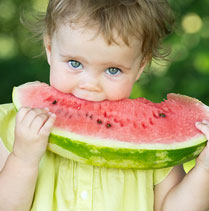
Having trouble finding success at mealtime with your toddler? Try these tips to make eating more fun for you and your toddler.
Toddlers grow far more slowly than infants, so it is natural for their appetites to decrease. At the same time your child is becoming more independent and exercising self-selection when it comes to food. Put this all together and your toddler is likely to be eating small amounts of unusual combinations of food. It’s quite natural for you to be concerned.
Toddlers are a study in contradictions. One day they cling fiercely to you, and the next, push away, exclaiming, “I do myself!” It is no wonder that these contradictions spill over into food selection and eating behavior. Between ages 1 and 3, eating becomes part of your child’s overall learning experience. When toddlers eat, they see, touch, feel, and smell the food – then they may put it into their mouth. Peas roll, juice splashes, spaghetti wiggles and crackers break.
Remember these tips to help you keep your sanity while riding out the food woes of the terrible two’s:
- Food fussiness is a natural part of development. Toddlerhood is the time when a child learns to say “no.” They are beginning the separation process and becoming more independent.
- Bizarre meals and food rituals are normal. A special plate, a certain juice, or a steadfast refusal to use a spoon are simply ways for your child to exercise self-control.
- “Food jags,” are very common. This is when a child will only eat one food item meal after meal. The easiest way to handle food jags is to go along with them within reason.
- If your child loves cottage cheese, serve it every day for lunch. At breakfast and dinner give a spoonful of cottage cheese along with the regular meal choices. Don’t be surprised if at first your toddler refuses to eat anything but cottage cheese. Don’t panic, she is not starving!
- A couple of small meals will not hurt a healthy child.
Research has shown that those parents that try the hardest to get their kids to eat right wind up with the pickiest eaters. Don’t make a big fuss about food refusals. Children, even very young ones, are smart. If you worry openly about what they eat and when they eat, you provide them with a powerful weapon to manipulate you.
Meat and vegetables are foods that many toddlers refuse.
- For meat:
- Your toddler may reject it because of the trouble it takes to chew. Toddlers are often too busy to eat.
- If your toddler spits out meat, even when you cleverly hide it in mashed potatoes, don’t worry. Try ground meat, fish, eggs, cheese, peanut butter, tofu, peas, and beans as good alternate protein sources. By kindergarten, most kids are happily eating meat
- For veggies:
- Your toddler may find the taste of many green vegetables to be bitter. Their taste perception is sharper than yours, making some vegetables unpleasant to eat.
- Simply offer alternatives – carrots, squash, beets, and corn.
- If your toddler declares all vegetables off-limits – switch to fruits. Fruits and vegetables contain a similar complement of nutrients and applesauce, blueberries, watermelon chunks, fresh peaches or apple slices can all be a nice accompaniment to a meal.
- Children broaden their tastes as they grow. Don’t be surprised if your child goes off to nursery school and comes home in love with broccoli.
Also, remember that toddlers need more than 3 meals a day. They have small stomachs and short attention spans, making it hard to eat much at one sitting. Most need 3 small meals and at least 2 snacks a day.
Follow these tips to feed your hungry toddler:
- Don’t hand your child something to eat every time he comes near you.
- Think about meals and snacks as a collection of foods for the day.
- If your child gets up early, she will need a mid-morning snack to make it till lunch. He may need a prenap or evening snack too, depending on his activity level and how long he is awake.
- Loosely schedule snacks around the day’s events. But, don’t encourage constant nibbling.
- Give your child a chance to perceive hunger and fullness accurately. There is no harm in a child asking for something to eat or drink. Many overweight children do not know what it feels like to be hungry or full. These sensations are part of development and will help regulate food intake throughout life.
You can’t avoid food refusals, crazy combinations, missed mouthfuls, spills and just plain playing with food. Simply knowing that food fussiness and food messiness is part of being a toddler can help you relax and enjoy the show.
© NRH Nutrition Consultants, Inc. Reprinted with permission from HealthNewsDigest.com












